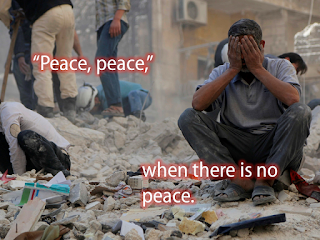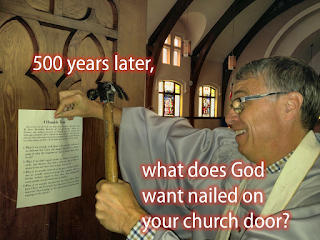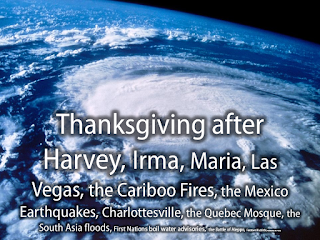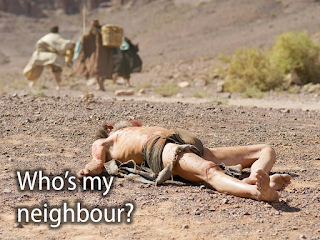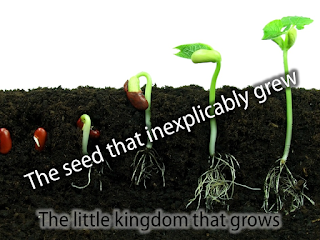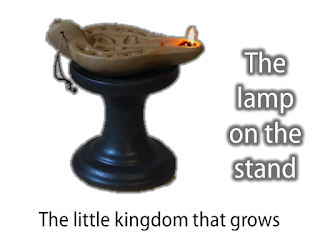Hespeler, 5 November, 2017 © Scott McAndless Remembrance Sunday
Jeremiah 6:10-15, Matthew 10:34-39, Ecclesiastes 3:1-8
| W |
e call Jesus the Prince of Peace. We love to tell the story about how, when he was born in Bethlehem, the angels sang that an era of peace on earth had dawned. And Jesus was the one who said, “Blessed are the peacemakers, for they will be called children of God,” wasn’t he? I don’t know about you, but that is one of the key reasons why I am pleased to identify myself as a follower of Jesus. We need peace. The world needs peace. And on a day of Remembrance like this when we remember all of the carnage, all of the death and all of the grief of war, we particularly look for the healing power of peace. Indeed, no one craves peace more than veterans who remember war’s horrors all too well and soldiers on active duty. So I feel blessed indeed to be a follower of the Prince of Peace
But Jesus doesn’t seem to have always remained consistent on the topic of peace. There were days when he seemed to be no fan of it at all: “Do not think that I have come to bring peace to the earth;” he warned. “I have not come to bring peace, but a sword.” And he further promised that he would stir up trouble between all sorts of people: sons and fathers, daughters and mothers pretty much anyone else in any household.
Is it just me, or is there a certain inconsistency there? Either Jesus came to bring peace on earth or he came to banish it. You can’t have it both ways, but Jesus apparently thinks you can. It is, in fact, one of those contradictions in the Bible that I have wondered about the longest. Except it is not a contradiction – not really – it is more a matter of definition, of people using the same words in wildly varying ways.
What Kaepernick was asking for was a bit of justice and peace for minority people who looked like him. He was just trying to create some peace for a certain group of people for whom peace was lacking.
But what has been the response to his protest and to others who have joined in. As you may have heard that there have been a lot of negative reaction. And one of the most common negative reactions seems to have gone along the lines of, “Why, Colin Kaepernick, do you want to disturb my peace. I just want to go to a nice football game, to have a nice afternoon’s entertainment and I just want to be able to stand there and feel my heart swell with pride for my country which I love as I listen to the National Anthem. Why do you have to go and ruin my peace with your self-centred grievances?”
So you see it is quite possible that Kaeperneck’s quest for peace could totally disturb the peace of somebody else. And I think that Jesus could be saying something similar to that in our passage this morning. He is not denying that he has indeed come to bring peace on earth, he is just warning that the kind of peace he is bringing doesn’t necessarily look like peace to some people.
For most of us, when we ask for peace, what we are usually looking for is tranquility. We want calm waters and smooth sailing. We especially don’t want anyone causing any trouble. That is what it means when frazzled parents ask their children for a little bit of peace and quiet. That is what people often dream of at the end of a war. When we pray and ask God for peace, that is also often what we are looking for. But what if that is not what God means by the word peace?
The quest for tranquility and calm waters, although understandable, has certainly taken us to some bad places. Over the last several weeks, we have heard a number of terrible accusations of sexual harassment, misconduct and even rape against high profile and powerful men in the entertainment industry, media, politics and other places. So many stories have surfaced and they are so terrible that it seems undeniable that there has been (and continues to be) an epidemic of abusive, powerful men in our society who have gotten away with it for a very long time.
But the obvious question is how – how is it that so many victims of so much abuse have been persuaded or forced to remain so silent for so long? That is a complex question with multiple answers, but one of the answers is definitely that our society often prioritizes peace over justice. Women who have experienced abuse have had it drilled into them that they must not disturb the waters or cause conflict by complaining or reporting. Peace in the workplace – and especially peace for powerful men – is considered to be more important than doing what is right for victims. But what if that is not what God means by the word peace?
In 1963, at the height of the Civil Rights Movement in the United States, Martin Luther King Jr. went down to Birmingham, Alabama (in the heart of the most racially segregated part of the country) to lead some non-violence actions. While he was there, not surprisingly, he was arrested and thrown into the Birmingham City Jail where he remained for quite some time. While he was there, the clergy in the area – the white clergy – gathered and came up with a statement that they published. They declared that the Civil Rights Movement was seeking what was right – that it was working for racial justice. But they condemned the actions of King and the other leaders. They said that stirring up trouble and getting people upset was not the way to bring about the change that was needed.
Martin Luther King, as you might expect, disagreed. And from his jail cell he wrote a letter – famously known as the Letter from a Birmingham Jail. It is a letter that I like to keep with me and take out and read from time to time because King had a way of putting his finger right on what the problem is with the wrong idea of peace. He wrote this, in part, “I must confess that over the last few years I have been gravely disappointed with the white moderate. I have almost reached the regrettable conclusion that the Negro's great stumbling block in the stride toward freedom is not the White Citizen’s Counciler or the Ku Klux Klanner, but the white moderate who is more devoted to “order” than to justice; who prefers a negative peace which is the absence of tension to a positive peace which is the presence of justice.”
That is, I believe, a helpful way to think of the issue. There is such a thing as a negative peace which is all about the absence of things like tension, conflict and trouble. And I understand how attractive that kind of negative peace is. I also understand that we all need it sometimes because you cannot live in continual conflict. But Jesus, the Prince of Peace and the one whose advent offers peace on earth doesn’t promise you that kind of peace. Sometimes he will bless you with it and you can be grateful when it comes, but when a negative peace becomes your main goal, you become an obstacle to true peace. The white moderate Christians that King was talking about, by prioritizing order and a lack of conflict, were actually perpetuating the problems and injustices that would prevent genuine peace or what King calls positive peace.
Positive peace is the kind of peace that Jesus did come to bring on earth – peace with justice, peace that is the very presence of justice. That is actually a promise that is coded into that very angelic hymn that was sung at Jesus’ birth. When the angels sang about “Peace on earth to people of goodwill,” that phrase would have been very familiar to the shepherds and to anyone who heard the story.
“Peace on earth,” was a propaganda phrase that was used by Roman Emperors at that time – a phrase that has been found on countless monuments and inscriptions. One of the things that made the Emperor an emperor was the fact that he had brought about peace on earth. He had brought peace on earth through victory – by defeating all of his enemies so that there was nobody left to make war any more. It was a negative kind of peace – a peace that was created through the absence of conflict – but as far as the Romans were concerned, that was the only kind of peace that mattered and only the Emperor could bring it.
For the angels and the early Christians to just say that somebody other than Caesar had brought peace on earth was to defy the emperor. It was also to say that the emperor’s definition of peace on earth – a negative peace – was insufficient.
Remembrance Day is celebrated every year on the eleventh hour of the eleventh day of the eleventh month, because it was at that moment in time in 1918 that the First World War ended. Except it wasn’t called the First World War at the time. It was called the Great War and it was called the War to End all Wars. It was called that because victory in that war was supposed to bring a permanent peace. It was a peace through victory moment – a negative peace through an ongoing lack of conflict.
How did that turn out? Not so well. The peace that the victors imposed on Germany and its allies in the Treaty of Versailles did not have a whole lot in the way of justice going for it. Today it is generally agreed that the peace that was imposed in 1918 set Europe up for the terrible war that began twenty one years later.
We celebrate today and on this coming Saturday all of those who served and who fought in those conflicts and in too many others that have followed. Few of those people fought because they loved the conflict; they fought for the sake of peace and in the hope of peace. But I must ask what would truly honour their service and their sacrifice? I would suggest to you that what truly honours them is not simply a pursuit of negative peace. That is the temptation, of course. So many of us would settle for a mere absence of conflict – especially those who have gone through the horrors of war. But negative peace will never be a truly lasting peace.
That is why I believe that we must truly honour our veterans by choosing to dedicate ourselves to positive peace, the peace that can only come when justice reigns in this world. But if we are going to do that, we will have to take what Jesus says in our gospel reading this morning seriously. It means that we must not shy away from conflict or from uncomfortable situations when questions of justice and what is right are on the line. That does not mean that we should resort to violence, by the way (Jesus taught his disciples that committing violence can and should be avoided whenever possible) but it does mean a willingness to disturb the waters and maybe to make people feel uncomfortable.
Peace is a worthy goal – one of the things that this world needs most these days. But it is so very important and valuable that we must not settle for anything less than true positive peace and the road to get there may sometimes be rough indeed. God give us all the strength to stand up for justice and for what is right, as troubling and uncomfortable as that can be sometimes. That is how we will discover the fullness of the promise of the kingdom of God in this world here and now.
140CharacterSermon #Peace, according to #Jesus was not avoiding conflict. Sometimes working for peace with justice meant creating conflict.
